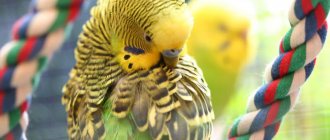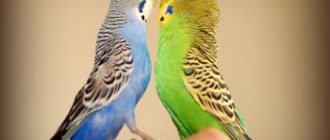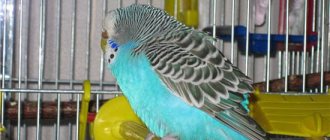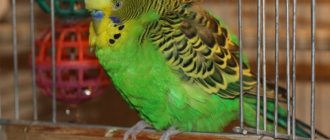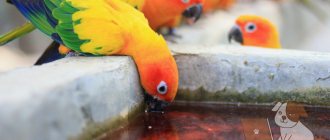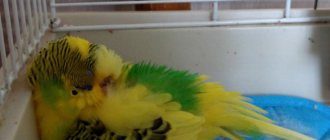The bond between humans and pets dates back to before the beginning of time. Pets satisfy the human need to love and cherish. As a rule, loyal dogs or mysterious cats are the most popular among animals. Many people don't consider cockatiels, or birds in general, as pets.
True, cockatiels can become loyal pets and outperform even a dog. Australian parrots are social birds and love to chat. They are lively and curious, and with proper training, cockatiel singing can provide a lot of fun and entertainment. The Nymph (another name for the Australian parrot) is loyal to its owners, and their friendship will last for many, many years.
Why does a parrot scream at home:
- your bird is new and not yet tamed . A particularly wild parrot is under great stress when changing its environment; the slightest sound or your sudden movement around the room can frighten it greatly. The parrot begins to scream loudly out of fear.
Reason: by shouting he is trying to scare you away and keep you at a decent distance from his cage;
- parrots scream if they hear trills or cries of other birds outside the window. At such moments, their cry is similar to a call; they try to reach out to other birds;
Photo: Ellen Aparicio - The screams of parrots in the morning are completely natural sounds. Bird activity in nature most often occurs in the morning and before sunset. The biorhythms of domestic parrots, with proper regulation of daylight hours, coincide with their wild relatives;
- if a bird screams loudly at the sight of a cat , dog, stranger, or when you place an object close to the cage, this can only mean that your pet does not like what is happening. With his voice he tries to express his indignation or fear.
In this case, try to protect him from such stressful situations and do not allow irritating and frightening factors to be present in the life of the bird;
- the continuous cry of a parrot, when you are sure that the conditions for it are met and there are toys and food nearby, it walks regularly and receives plenty of attention from you, is a reason to consult a doctor.
If it is not a pampered bird, its cry may mean that the parrot is in pain;
- when the feeders run out of food or you haven’t given the daily portion of vegetables and herbs, the bird may begin to demand food by voice. Check if everything is in the cage;
- Some parrots are jealous of other family members or pets. Here you already need to fight the scream, whose parrot demands attention.
Photo: Chise Pluton - the parrot screams loudly when you leave for work and leave your pet alone. Birds yearn for their owner and express this feeling by screaming; such constant stress can lead to various kinds of diseases, so try to prevent this.
To do this, the bird must be accustomed from the first days to the fact that it will remain alone for some time.
If you have a parrot not only alone during the day, but also spends most of the time alone with itself due to the fact that you do not have enough time for it - or do not get a bird if you know that you cannot devote enough time to your pet or buy a bird friend.
Parrots are by nature flocking birds and keeping them alone is not a good or positive thing for them.
In addition, you need to provide the bird with an interesting pastime. toys are perfect - the bird will have a great time doing something interesting.
Photo: moccasinlanding
You can also turn on the radio quietly - the parrot does not have to sit in complete silence; melodies and other sounds can also entertain him.
Depending on the type of parrot, the reasons for screaming can be different, and their volume and intensity also vary greatly.
Budgerigars can chirp like sparrows; such a cry most often indicates the bird's dissatisfaction, a quarrel between cagemates, or extreme excitement. Single calls with short pauses call the birds - this is a call and a statement of their presence.
Musical experiment
Information about dancing parrots interested zoologists. Scientists from the UK decided to test experimentally whether birds really dance. Three Grays were chosen for the study as the most intellectually developed. The birds played compositions from different genres: reggae, rock, country folk, classical. Observers found that Grays actively danced to rhythmic melodies, while Bach's works had a calming effect on the birds.
Zoologists installed a touch screen with two buttons in front of the birds. After touching one of them, an audio recording of energetic, catchy music was turned on. Another button played quiet, relaxing sounds. Jaco pressed the buttons a total of more than 1,400 times in a month. At the same time, no dependence on a specific melody was revealed.
Different preferences
Experience with the screen showed that parrots are partial to melodies. They distinguish intonations, dance, falling into the rhythm. However, it was not possible to find out what kind of music birds like more. The experiment confirmed the diversity of preferences in this area: some birds have fun listening to the soundtrack of dance songs, others – listening to the recording of an instrumental orchestra, and still others like hard rock. Such differences in individuals of the same species living together are explained by the individuality of their characters.
Music without words
Parrots cannot be called music connoisseurs, but they do not like electronic recordings called “techno” or “club”. Birds don't like computer generated sounds. After listening to such compositions, birds become uncontrollable and aggressive. They flap their wings, make noise, and express their displeasure in every possible way. In addition, such annoying works have a bad effect on learning.
Parrots not only dance, but also repeat words from songs and copy intonation. Talking birds expand their vocabulary by listening to audio recordings daily. If you love music, your pet has every chance of becoming a music lover.
Why does a parrot make unpleasant noises?
Depending on the type of parrot, there may be different reasons for screaming. Their volume and intensity also vary.
Runs around the cage and screams
A bird may do this for the following reasons:
- wild and untamed individual;
- stress, anxiety, fear, feeling of danger;
- disease or parasites;
- change in living conditions or family composition;
- lack of food or water;
- an attempt to attract attention.
In addition, parrots do not like to be left alone and can react with loud sounds when their owner leaves the house.
Therefore, it is better to have several birds at once, and if there is only one pet, you should gradually accustom it to the fact that for some time it will be deprived of company. Many birds respond well if they are left with a radio turned on quietly.
Yells in the morning
The cry of birds in the morning is a completely natural phenomenon. The fact is that their greatest activity occurs in the early morning hours and before sunset. Therefore, the biological rhythms of parrots living at home completely coincide with the rhythms of their wild relatives.
The exception is situations when the length of daylight hours is artificially regulated. For example, if you put a blanket over a parrot's cage, then most likely there will be no usual morning cry.
Screams at night
If the parrot has recently appeared in the house and is not tamed, then any sounds or movements may frighten it. This is the headlights of a passing car, sounds outside the window, the cry of a night bird, the noise of a fan or the movement of curtains. The result of this is a strong cry, with which the bird expresses its fear and tries to scare away a potential enemy.
During this period, she may begin to rush around the cage, risking damage to feathers or wings. If this happens, you need to immediately turn on the light, calmly and affectionately talk to your pet, and offer him fresh water. It is also necessary to remove damaged feathers and treat these areas with a solution of hydrogen peroxide.
And when planning the cage environment, perches and toys should be positioned in such a way as to reduce the risk of injury in the future.
How to Avoid Noisy Parrot Behavior
Having been alone for a long time, the bird screams continuously, causing a lot of trouble to its owner and his neighbors. This behavior cannot be called the norm, and it is easier to prevent than to correct.
If a bird breeder does not have the opportunity to devote time to his pets and take care of them, there is simply no need to get poultry. Otherwise, there will be no time to understand the reasons for the strange behavior, and then decide why the bird got sick.
If the periodic screaming of a lonely budgie causes discomfort, you can buy him a pair. In this case, the desire to be indignant and attract attention with loud sounds will completely disappear from the bird - he will be carried away by communication with his relative.
If a parrot, especially a budgerigar, screams like it does in a rainforest when alone, it needs to be entertained. To do this, a swing, ladders, perches are installed in the cage, and a mirror is hung. This way, in the absence of the owner, the bird will entertain itself on its own, and silence will reign in the house. You can also turn on the radio quietly in your absence: music and human speech will not let your parrot feel lonely.
The most noisy parrots: the nature of the cry and its reasons
Many bird owners note that the most noisy of them are cockatiels and budgies.
Corella screams all day long
Corellas are one of the most talkative species of parrots. Moreover, their sounds, already quite sharp, can develop into an almost unbearable scream.
Most often, this happens to wild or overly spoiled individuals.
- If you get a wild parrot, you need to be patient to train your feathered pet. Having gotten used to you and the new environment, he will begin to behave calmer.
- In the second case, only a competent reaction to his cry will help. You should not run into the room at the first call of the cockatiel - on the contrary, he must understand that they approach him, let him out for a walk, or give him food only when he behaves well. And such behavior should be encouraged in every possible way.
Why do parrots dance and sing?
Speaking about the mental abilities of parrots, it is worth noting one outstanding property: feathered intellectuals have a sense of rhythm. On forums, pet owners often report that their parrots dance to music and even sing along with the performer.
If you want your parrot to learn to sing along to different melodies, then first you should play him whistling tunes. The following selection is perfect for training your feathered pet.
Whistling melodies from movies to help your budgie learn to sing:
It is difficult to reliably explain the reason for this phenomenon. There is an assumption that intelligent birds become dancers by imitating humans. While dancing, the parrot usually looks happy; the exciting activity completely captivates it. The feathered bird moves its head, moves its paws, and flaps its wings not at all for a treat, although this is possible. Dancing and singing to music gives the bird pleasant emotions and serves as entertainment.
This is interesting! Scientists have uncovered the mystery of parrots - why they dance. The brain is designed in such a way that it has “learning nuclei” - groups of neurons. The connection of areas with the motor centers of the brain controls speech and body coordination.
How to stop a parrot from screaming
Before you try to wean your pet from screaming, you should determine its cause. To do this, it is worth observing him for some time and noting the situations in which he begins to scream.
It is best to record this data in table form.
- Date and time.
- Condition for a cry to occur.
- The nature and duration of the cry.
It is better to fill out the table over a long period of time, while simultaneously monitoring the health and appearance of the bird.
If you have any suspicions about possible illnesses, it is better to seek help from a specialist. Perhaps the reason for your pet's behavior is some kind of disease. In other cases, it is necessary to analyze the data obtained.
Morning screaming is normal, but if for some reason it is undesirable, you can simply reduce the bird's daylight hours by throwing a cloth over the cage. Then the parrot will be calm until you remove it.
The same measure will help get rid of night screaming. It will also allow you to regulate the bird’s sleep pattern so that its duration is 10 hours in summer and 12 hours in winter.
If the cause of screaming is stress, you should try to avoid situations that cause it. For example, many birds do not like sounds that are too loud or noisy class=”aligncenter” width=”620″ height=”392″[/img]One of the main reasons for screaming is the desire to attract the attention of its owner. Therefore, you need to try to spend as much time as possible with the bird so that it constantly feels your care and attention.
The most screaming parrots: how different species scream
Before you get a pet, you should consider your options. In particular, how will your neighbors or relatives react to noisy birds. Moreover, there are breeds that are particularly loud.
Macaws are not only the loudest screaming birds, but also require special conditions of detention. It is not easy to keep them in a cage, as there is always a risk of damaging the beautiful plumage of the long tail and wings. In addition, with their powerful beaks, these birds love to chew on everything. Listen to how a macaw parrot can scream and think whether you will be able to listen to this “music” for many decades:
Solar aratings are much smaller in size than macaws, but they are not inferior in volume. The calls of these parrots can be heard at a distance of two or more kilometers. Don't believe me? Listen for yourself:
The cockatoo is another screaming parrot. Its advantages: graceful beauty, amazing artistry, affection and immense affection for its owner. But their shrill screams can drive sensitive people crazy. Listen to the cockatoo parrot scream:
Amazons are very loud, but their strong advantage is their excellent ability to reproduce human speech. They easily grasp words and sounds, so it is better to watch what you say so that one fine day your pet does not surprise your guests and yourself with a rich vocabulary.
The necklace parrot , despite its medium size, can scream very loudly and shrilly. Moreover, it is rather an ear-piercing screech with which he tries to shout over everyone. It is his voice that is the most recognizable in the vastness of South Asia:
The African gray parrot is popular for its onomatopoeic ability. These birds perfectly remember words and entire phrases, a wide variety of sounds. The most amazing thing is that sometimes it seems that they understand what they are talking to you about. However, few people know that these parrots can scream very loudly:
Cockatiels are not the quietest parrots. They make sharp, monotonous sounds - this is when the birds are in a good mood, but if something does not suit them and they decide to scream, then the scream will be loud. They also know how to be funny and indignant, judge for yourself:
Lovebirds are beautiful, cheerful and sociable birds that also don’t mind making noise, although the sounds they make are not screams, but a piercing, ringing chirping that feels sharp and sharp:
Budgerigars are also quite noisy birds. Due to their small size, they may not be as “loud” as larger species of birds, but their chirping does not always bring pleasure to their owners. These nimble birds can scream for any reason and in different ways:
- when they are dissatisfied with something or quarrel with their brothers, they make abrupt, sharp sounds;
- when they are bored, try to attract attention, want to leave the cage or ask for food, they chirp abruptly;
- the male attracts the female by singing and clicking;
- when they communicate with each other or are glad to see you, they chirp melodiously;
- They are excited about something, they are afraid - they scream for a long time.
What not to do
Even if the cry of a parrot literally drives you crazy, under no circumstances should you do the following:
- beat the bird or the cage it is in;
- shout at her;
- splash water.
This behavior will not only not help, but will most likely harm your feathered friend. This will cause him to be even more stressed and the screaming will continue even longer.
So, now you know that the key to a well-behaved parrot is a calm environment in the house and the right conditions for keeping it. You should take good care of your pet, be attentive to its health and spend enough time with it - and then your feathered friend will bring you only joy.
What do the various sounds made by birds indicate?
A quiet chirping, similar to a sparrow's, speaks of excitement and dissatisfaction. This could be a sign of a quarrel between the birds in the cage. If the soft calls of budgies are repeated at certain intervals, this means that the bird is calling its fellows, looking for a mate or friend to communicate.
Flying out of the cage, the parrot makes quiet joyful sounds. There is no need to panic about the screaming of a parrot in flight, including a budgerigar - this is their natural feature.
Constant attention and the desire to please your pet in everything can spoil it and contribute to inappropriate behavior. In the case of feathered inhabitants of human homes, the golden mean is important: you should not leave the bird alone for a long time, but you should not rush at its first call.
Chirping is a normal natural state for all birds, including parrots. Before buying, it is advisable to observe the individual you like and listen to what sounds it makes, so that an unexpected whistle, grinding or creaking does not become an unpleasant surprise in the future.
Characteristics of parrots
To stop a parrot from screaming, you need to use an individual approach. Depending on the subspecies of the bird, the volume and nature of the screams may vary.
For example, budgerigars make sounds very similar to passerines. But this chirping is usually a sign of a quarrel, dissatisfaction or excitement in the pet. They also scream out of boredom or joy. They love to scream in flight, but nothing can be done about it.
Cockatiels are also noisy birds. They really love to make noise: if the cause of their discontent is not identified in time and does not get rid of it, a terrible din will arise. But you can’t resort to them at every cry - this will spoil the feathered brawler and teach him to yell all the time. It is often worth calming and treating cockatiels only while they are silent - this way you can teach them to maintain silence.
Be sure to open the cage from time to time, without waiting for the loud cries of your pet. He must understand that he is allowed out for a walk, regardless of the screams.
When does a parrot make loud noises?
The reasons for the strange behavior of a bird are quite varied, from poor health to a noisy morning awakening:
- The bird does not live in the house for long, is afraid of everything and begins to make sounds unusual for it in a calm environment.
- Buying a wild specimen from the hands can bring a lot of trouble to the owner, including restless behavior with loud screams. This may disturb the inhabitants of the house. A wild bird, not accustomed to living together with a person, often shows anxiety and screams. But in the case of budgerigars, this is practically impossible, since it is very difficult to purchase a wild bird of this breed.
- Budgerigars, making shrill sounds, try to protect their home, personal space, food, offspring from humans or pets. A female with chicks, a male during the mating season, or a newly purchased bird can make frightening, sharp sounds.
- The trills of wild fellows outside the window can awaken a desire in a domestic feathered pet to communicate with other birds. By emitting a calling cry, the bird signals this.
- Loud chirping in the morning and at sunset is a natural call for all birds, including parrots.
- The approach of other pets - cats, dogs, ferrets - can frighten the bird, and it will drive away uninvited guests from its home. Strangers in the house will cause a similar reaction in the parrot.
Important! If a budgerigar gets anxious at the slightest reason, it must be protected from stressful situations.
How to fix the situation
To prevent a parrot from screaming, you must first determine the reason for the animal’s excessive activity. It is recommended to keep a small diary in which you should describe all cases of agitation in your pet. It must indicate the date and exact time of the event; possible conditions and irritants that could disturb the parrot; characterize the cry (hysterical, irritable, painful, frightened, etc.). At the same time, it is imperative to monitor the health of the bird.
After observing the animal, you can identify certain patterns and come up with ways to deal with screaming. For example, in some cases it is worth artificially reducing daylight hours. To do this, you need to cover the cage in the evening with something dark that does not allow light to pass through. It will be easier and more peaceful for your pet to fall asleep.
If the poor guy is stressed, you need to remove the cause from the environment. If he wants to communicate, you need to play with him. You can pour warm water into a mug - it has a calming effect not only on people.
Many try to direct the animal’s energy in a different direction. You definitely need to keep your bird busy - playing or feeding. You can throw new branches to her, let her look at them. Some people teach parrots to talk. Good behavior is always rewarded.
If there is no way to communicate with the parrot at all, you should open the cage - let the bird feel free, fly around the room and explore its surroundings.
Thus, by keeping a diary of “excitement,” the owner has the opportunity to monitor the state of his feathered friend and prevent screams in time.


